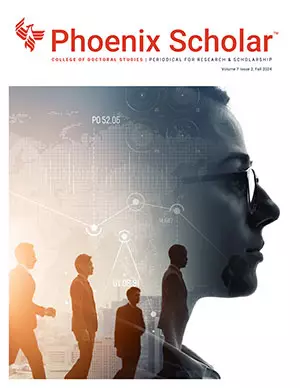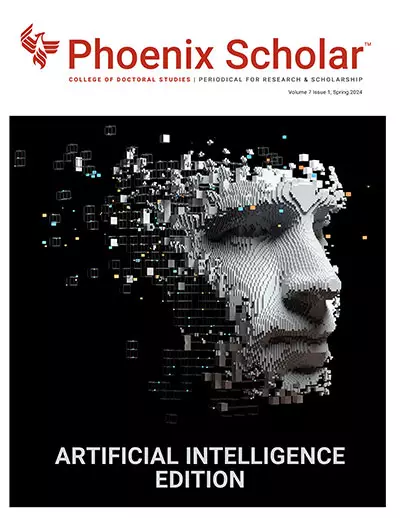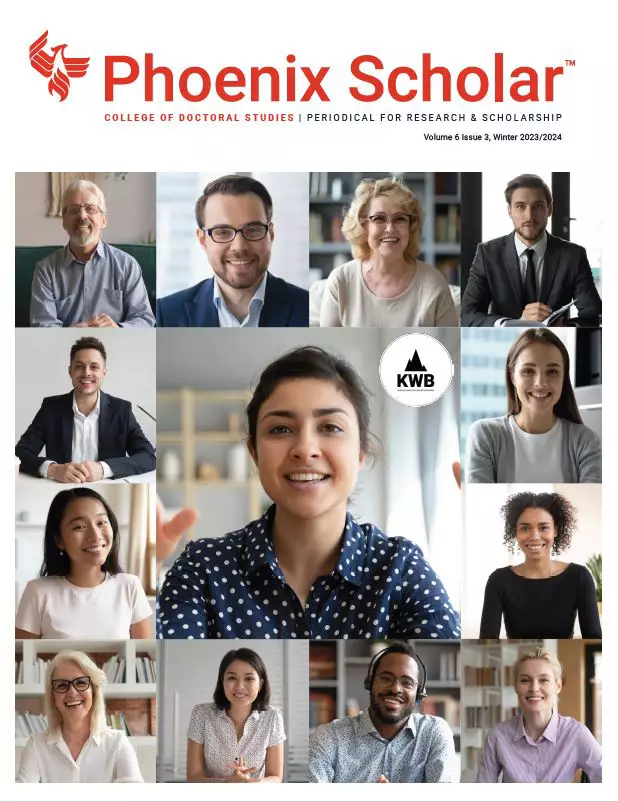Magazine
Phoenix Scholar
Journal for research & scholarship
About the Scholar
Phoenix Scholar showcases the commitment of АФУХЬьЬьВЪПЊНБМЧТМ faculty, students and alumni to help foster the process of leading research through evidence-based practice. It serves as a dynamic and robust platform for sharing research results and outcomes and exploring their relationship to the broader scope of learning and scholarship.
The Phoenix Scholar is an open-access journal, which means that all content is freely available without charge to the user or his/her institution. Users are allowed to read, download, copy, distribute, print, search, or link to the full texts of the articles or use them for any other lawful purpose without asking prior permission from the publisher or the author. This is in accordance with the BOAI definition of open access. Additionally, there is no charge for researchers who seek to publish within the periodical.
Current issue

fALL 2024
Embracing a Transformative Vision for a Brighter Future
In an era of significant global challenges, the call for transformative research and practice has never been more urgent. The Fall 2024 edition of Phoenix Scholar delves into the advancements reshaping our understanding of the world and fostering innovative solutions.
The articles featured in this edition highlight the capacity of research to inspire positive change, showcasing discoveries and social interventions. We examine the interplay between theory and practice, exploring how inquiries can inform effective actions and how those actions, in turn, can influence research.
Key themes include transformative research in Artificial Intelligence and education, healthcare, business, and employee wellness. Highlighted topics include implementing transformative strategies to support and retain students and faculty in higher education, cultivating student career readiness, and enhancing online education. Additionally, weТ delve into transformative inquiry as a means to nurture human potential and reshape contemporary organizational leadership. Join us in this invaluable journey of exploration and discovery.
Want to get published in Phoenix Scholar?
Submit your article for consideration to be included in the Fall 2024 issue.
Started in 2017, the Phoenix Scholar began as a periodical created to showcase research conducted within the АФУХЬьЬьВЪПЊНБМЧТМ, College of Doctoral Studies. Since then, the Phoenix Scholar has developed into a robust research periodical with its own ISSN from the National Library of Congress. The primary areas for research the periodical seeks are contained within the following disciplines:
- Education
- Technology
- Diversity and Inclusion
- Healthcare
- Psychology
- Business
- Leadership
- Organizational Studies
Additionally, the focus remains on scholarship and practice within research where authors can share their current research, article reviews, conceptual papers, and empirical research, thereby extending to the academic community at large and on a much broader scale to all communities with issues that affect society and the world.
The benefits of engaging the journal include:
- Access to current topical issues within the social sciences.
- Gaining a greater understanding of a variety of social science issues.
- Helping support the readers' own research interests as reference material.
- Helping guide those seeking to understand a specific topic or issue.
For researchers submitting, the periodical is a conduit for sharing and expanding their findings, exploring the potential of connecting with a broader audience, enhancing their own writing and authoring credentials, and contributing to the body of research on specialized topical matter.
Publication Frequency
The Phoenix Scholar publishes two scheduled issues during the Spring and Fall quarters, plus one or more special issues annually. The special issue themes and deadlines are generally published at least six months before the publication date.
Open Access Policy
The Phoenix Scholar is an open-access journal, meaning that all content is freely available to the user or his/her institution without charge. Users are allowed to read, download, copy, distribute, print, search, or link to the full texts of the articles or use them for any other lawful purpose without asking the publisher's or the author's prior permission. This is in accordance with the BOAI definition of open access. There is also no charge for researchers seeking to publish within the periodical.
Open Archive All past issues of the Phoenix Scholar are available for review at Phoenix Scholar Archive.
Sponsors
Center for Leadership Studies & Organizational Research
The Center for Leadership Studies and Organizational Research (CLSOR) regards the spectrum of business and organization as all-encompassing, where the potentials of scholar-practitioner engagement intersect with industry dynamics to uncover the possibilities that emerge when research is applied. Our focus is on the core competence of UOPX regarding leadership and organizational practice. These aspects covers a wide range of disciplnes from all aspects of industry including healthcare, technology, psychology, and so much more, where business is at the intersectional fulcrum. In a world where business practices and leadership have become an even greater imperative, we seek to engage research that always reflects some of the most innovative and relevant topical matters.
Center for Educational and Instructional Technology Research
The CEITR is the go-to department for faculty, staff, students, and alumni who are passionate about using technology-based tools, learning theories, and instructional strategies to promote quality teaching and learning. With a strong focus on K-12, higher education, and corporate settings in both online and face-to-face formats, the center proactively tackles the challenges related to online teaching and learning, as well as global trends and issues in education.Т The center is a place where students, alumni, and faculty will find the collegiality and socialization necessary for an advanced community of learning. The research will be cultivated and supported in a variety of ways including offering the center membership, research fellowship, or student assistantship.
Center for Workplace Diversity and Inclusion Research
The Center for Workplace Diversity and Inclusion Research (CWDIR) serves as the research home for faculty, students and alumni who have an expressed interest or have an existing research agenda related to the topics of diversity, equity, inclusion and belonging (DEIB) in workplaces and communities of practice.Т As diversity, equity, inclusion and belonging (DEIB) research encompasses a broad range of possible research topics, the Center brings together scholars across various disciplines to support existing research agendas and generate new and innovative ideas for future research and scholarship. The Center seeks to create a progressive community of scholarship by providing collegiality, support and resources to faculty, students and alumni. Opportunities for research are cultivated and supported in a variety of ways within the Center, including establishing direct affiliation with the Center and its articulated research and scholarship agenda, serving as an advisor or contributor or serving as a Fellow-in-Residence for the Center.
The Career Institute
АФУХЬьЬьВЪПЊНБМЧТМ Career InstituteТЎ was created to address broad, persistent and systemic barriers to career advancement through research-based solutions and impactful partnerships that break down barriers Americans face in their careers.
The Phoenix Scholar allows for the submission of research articles, thought pieces, and original research. Publishing in the Phoenix Scholar is voluntary, and we offer no compensation or guarantee of acceptance to prospective authors. Please review our process below if you plan to submit.
Submitting research work to the Phoenix Scholar periodical involves a series of steps designed to ensure that the submission is thorough, adheres to the Phoenix Scholar guidelines, and has the highest chance of acceptance. Here is the current process for research authors:
Step 1: Selecting the Appropriate Journal [Theme]
1.1 Review a Periodical Issue [Scope and Aims]
ТЗ Read through a Phoenix Scholar: It is important to look through an edition of the Phoenix Scholar to get an idea of the kind of articles that go into each issue.
ТЗ Identify the theme of the issue: Ensure you read each call for proposed work and the theme of the "call" to ensure your article submission aligns with the scope and aims of the periodical.
ТЗ Evaluate the audience: Consider the Phoenix Scholar's target audience [Researchers, Students, Faculty, Alumni, General Public] and whether your research or writing target (content) will be of interest to them.
1.2 The Phoenix Scholar Guidelines
ТЗ Read submission "call for article" guidelines: Thoroughly read the submission guidelines provided by the Phoenix Scholar, which typically include formatting, word count, and any APA style guidelines.
ТЗ Faculty Journal Submission Agreement (JSA): Should we accept your work you will be provided a JSA to fill out and return to us. The agreement allows us to utilize your work in the scope of the Phoenix Scholar but does not preclude you from using it elsewhere. You can read the sample JSA here. Sampe JSA [not for submission unless received through Docusign].
Step 2: Preparing the Manuscript
2.1 Manuscript Structure and Formatting- Please review the tab for author guidelines.
ТЗ Adhere to guidelines: Follow Phoenix Scholar's formatting instructions regarding font type, size, margins, and headings. We will turn it back to authors who do not follow these prescriptives.
ТЗ Consistent style: Ensure consistency in writing style, terminology, and units of measurement.
ТЗ Language: If necessary, seek professional language editing services to ensure clarity and grammatical accuracy. We ask that you proof, proof, and proof your work to minimize the time it takes to get your work ready for publishing.
Step 3: Supplementary Materials
3.1 Figures and Tables
ТЗ Quality and clarity: Ensure that all figures and tables are high-quality, clear, and correctly labeled. We will turn down blurry imaging.
ТЗ Separate files: Prepare figures and tables in separate files if required by the journal.
ТЗ Legends and captions: Provide detailed legends and captions for all figures and tables.
ТЗ Ensure that the work is your own construct: Your tables and graphs should be your work, and if you are using someone else's tables/charts, you must have express permission to do so before submitting.
3.2 Additional Files
ТЗ Supplementary information: Include supplementary data or additional materials that support the main manuscript.
ТЗ Compliance with guidelines: Ensure all supplementary files comply with the Phoenix Scholar's requirements for format and file type.
Step 4: Ethical Considerations
4.1 Author Contributions
ТЗ Authorship criteria: Ensure all listed authors meet the criteria for authorship and agree to the submission.
4.2 Plagiarism Policy
ТЗ Plagiarism will not be tolerated.
ТЗ Plagiarism: The intentional or unintentional use of work that is not oneтs own, in whole or in part, without acknowledging the source and presenting that material as oneтs own original academic work. This includes, but is not limited to:
o Reproduction and submission of work which is not oneтs own, whether published or unpublished. This includes using materials from third parties that sell or provide academic papers or assignments, regardless of how the third party describes their mission, purpose, or materials. This also includes output generated by artificial intelligence tools.
o Using anotherтs ideas, written words, or intellectual property without properly acknowledging the source:
ТЇ Quoting a source word-for-word without providing quotation marks and citations.
ТЇ Submitting work that is substantially identical to another source in content or organization without appropriately citing the source.
ТЇ Using other intellectual property in a work without appropriate citations, permissions, or rights (when applicable). Intellectual
property includes but is not limited to images, presentations, videos, software programs, computer code, charts, figures, illustrations, and artistic or musical composition.
Step 5: Submitting the Manuscript
5.1 Submission Portal
ТЗ Typical "Calls for Articles" will be posted on the website: Each Phoenix Scholar may have a different Editor. Thus, we encourage you to look at the featured theme each time to ensure the correct editor of the issue you want to submit for is listed. You may also reach out to rodney.luster@phoenix.edu for more information.
ТЗ Follow instructions: Carefully follow the instructions for submitting your manuscript and supplementary materials. Most times we will use Dropbox as a receptacle for receiving works.
ТЗ Metadata entry: Enter all required metadata, including author information, keywords, and abstract during the call for articles.
5.2 File Upload
ТЗ Manuscript file: Upload the main manuscript file in the required format (e.g., Word).
ТЗ Supplementary files: Upload all supplementary files, including figures, tables, and additional data.
5.3 Confirmation
ТЗ Submission confirmation: Ensure that you receive a submission confirmation from the Editor.
Step 6: Post-Submission
6.1 Review Process
ТЗ Initial editorial check: The Phoenix Scholar staff will perform an initial check to ensure the manuscript fits the scope and meets basic requirements.
ТЗ Administrative review: The manuscript will be sent to the designated Editor and staff for evaluation of its quality, originality, and significance.
ТЗ Revisions: Be prepared to receive feedback and revise your manuscript based on reviewer comments.
6.2 Decision and Response
ТЗ Editorial decision: The editor will make a decision based on peer reviews, which could be acceptance, minor revisions, major revisions, or rejection.
ТЗ Revisions and resubmission: If revisions are requested, carefully address all comments and resubmit the revised manuscript within the specified timeframe.
ТЗ Acceptance: Once accepted, follow any additional instructions for final submission, including copyright transfer and proof corrections.
6.3 Post-Acceptance
ТЗ Proofreading: Review the proofs of your manuscript carefully for any errors or required corrections.
ТЗ Publication: Your article will be published in an upcoming issue of the Phoenix Scholar depending on our needs, both online and in print (if applicable).
ТЗ Faculty Journal Submission Agreement
o For potential authors, you should submit your proposed article to the Editor/or link for contact information when provided. Articles will go through the review process and if accepted, potential authors will be sent a Docusign document to sign for release.Т
xxТЗ Promotion: Consider promoting your published work through academic networks, social media, and conferences.
Conclusion
Submitting a piece of work to a periodical or journal like the Phoenix Scholar requires meticulous preparation, adherence to guidelines, and responsiveness to feedback. By following this detailed process, authors can enhance the likelihood of their work being accepted and published, contributing valuable knowledge to their field.
The following are active and current members of the editorial board for the Phoenix Scholar.
Executive Editor
Hinrich Eylers, Ph.D., Vice Provost for the АФУХЬьЬьВЪПЊНБМЧТМ College of Doctoral Studies
Editor-in-Chief
Mark McCaslin, Ph.D., Associate Chair for the Center for Leadership Studies and Organizational Research
Editor
Juana Lang, Ed.D., General Studies Faculty
Editor and Designer
Challie Facemire Ph.D.
Phoenix Scholar Director and Lead Designer
Rodney Luster, Ph.D., LPC, Senior Director of Research Strategy, Innovation, and Development, Center for Leadership Studies and Organizational Research
Associate Editors
Mansureh Kebritchi, Ph.D., Chair for the Center for Educational and Instructional Technology Research
Kimberly Underwood, Ph.D. Chair for the Center for Workplace Diversity and Inclusion Research
Editorial Board
Stella Smith, Ph.D.-Associate Research Chair for the Center for Educational and Instructional Technology Research
Louise Underdahl, Ph.D.-Fellow for the Center for Educational and Instructional Technology Research
Sandra Sessoms-Penny, Ed.D.-Fellow for the Center for Workplace Diversity and Inclusion Research
Joy Taylor, Ed.D.-Fellow for the Center for Workplace Diversity and Inclusion Research
2024 Editorial Calendar
For the 2024 Year, we have 3 PS editions with the last still in the planning stages. Themes are chosen by the editors and will be published as calls for papers are released periodically.
TENTATIVE PUBLISHING CALENDAR
ГЇБшАљОБВдВЕ/ГЇГмГОГОБ№АљЬ§2024
Theme-[Artifical Intelligence] The Phoenix Scholar, a publication dedicated to fostering scholarly discourse within the АФУХЬьЬьВЪПЊНБМЧТМ community and beyond, invites submissions for a special issue on the burgeoning realm of Artificial Intelligence (AI). In an era marked by unprecedented technological advancements, AI stands as a transformative force with profound implications across various sectors, including academia.
ЙѓВЙБєБєЬ§2024
[Education]-Editor in Residence-Dr. Mansureh Kebritchi
In an era marked by significant global challenges, there is an urgent need for transformative research and practice. This edition of Phoenix Scholar explores the cutting-edge advancements that are transforming our understanding of the world and driving innovative solutions. From research discoveries to pioneering social interventions, the articles within these pages showcase the power of research to catalyze positive change. We delve into the connection between theory and practice, examining how thorough inquiry can guide effective action, and vice versa.
Early Spring [Special Edition]Т 2025
KWB Summit [Open]-Editor in Residence-Dr. Kimberly Underwood
This will be a special edition that is a collective of conference proceedings from the 2024 Research Conference known as "KWB Summit," alongside keynote hghlights and interviews.
A full 2025-2026 Calendar will be published soon!
Call for submissions
We encourage you to submit articles that summarize your presentations, best practices and contributions to the literature, as well as the practice.
The Phoenix Scholar accepts submissions for article content within and external to the university. For further details on submission criteria, see the requirements below, or you may contact the Editor, Dr. Juana Lang atТ vickyhavana@email.phoenix.eduТ or the Managing Editor Dr. Mark McCaslin atТ mlmccasl@email.phoenix.edu
Past issues [2024-2023]

sPRING/SUMMER 2024
Volume 7, Issue 1
This issue offers a number of perspectives on AI's potential to enhance teaching methodologies, streamline classroom processes, and the possibility to catalyze groundbreaking research endeavors.
Winter 2023/2024
Volume 6, Issue 3
In this Special Proceedings Edition, weтve assembled the peer-reviewed presentation abstracts from the 2023 KWB Summit, including the 2023 College of Doctoral Studies "Dissertation of the Year" winners and a special interview with the KWB Keynote Speaker Dr. Cheryl Lentz.
Archived editions
Note for faculty in CaliforniaТ
This is a non-compensable activity. Participation in College of Doctoral Studies calls for proposals and activities are not job related, there is no benefit or detriment to participation, no unwritten expectation that you participate, and no critical work information will be conveyed.
Phoenix ScholarтЂ is published biannually, May and November, by the Office of Scholarship Support in conjunction with the College of Doctoral Studies (CDS). All rights reserved. The views expressed in articles do not necessarily reflect that of the editorial board or CDS.


